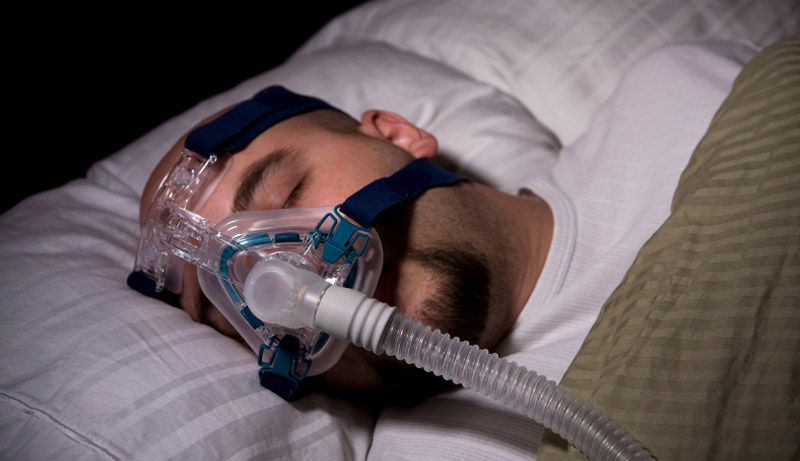
Our lungs and our heart are two of our most important organs and are closely intertwined. With every beat, the heart sends blood throughout the body to deliver oxygen to cells, organs and tissue, and then the blood makes its way back up to be reoxygenated by the lungs. Typically, it’s a seamless loop but if you have untreated sleep apnea, it can throw a major wrench into this vital system and lead to serious health problems.
Two Penn Medicine physicians who see patients at the Medical Office Building across from Shore Medical Center are also closely intertwined when it comes to sleep apnea. Penn Medicine Pulmonologist Dr. Upendra Dhanjal and Cardiologist Dr. Jim Davis recently weighed in on what sleep apnea is, and why getting proper treatment is essential to your health.
What is Sleep Apnea?
Sleep apnea causes your breathing to stop and restart while you’re asleep, making it hard for your body to get enough oxygen. These episodes of disrupted breathing generally last at least 10 seconds and occur frequently throughout the night. There are two main types of sleep apnea. Obstructed sleep apnea is when the soft tissue in your throat relaxes and makes it difficult to breathe. Central sleep apnea is when your brain has trouble regulating your breathing. Sleep apnea affects about 4 percent of the population and can lead to serious health problems, including stroke, high blood pressure and coronary artery disease.
Why Treating Sleep Apnea Matters
According to Dr. Dhanjal, the risk of stroke is 4 times higher in patients with moderate or severe sleep apnea.
Airway collapses during sleep create negative air pressure inside the chest, which can slow down blood flow to the brain. Obstructive sleep apnea causes the blood delivered to the brain not to have enough oxygen. This can cause the abnormal changes in the brain’s blood vessels, making the brain more vulnerable to damage.
In addition to increasing the risk of stroke, stress levels – particularly for pre-diabetic patients - are also higher if the patient does not get a proper amount of sleep. When stress levels increase, the body’s adrenal glands release epinephrine. The release of epinephrine causes a number of changes in your body known as the fight-or-flight response. Even though you are asleep, your brain perceives dangers during this flight-or-flight response and tells your heart to work harder and faster.
Dr. Davis says, “In addition causing your heart to work harder, Sleep Apnea also causes low oxygen levels, which then leads to constricting of the arteries. This increases hemoglobin levels which then causes more pressure for the heart to push against. Everything is affected.”
Dr Dhanjal further notes that low oxygen levels resulting from sleep apnea can also increase blood pressure in the blood vessels in the lungs. This increase is known as Pulmonary Hypertension. Pulmonary Hypertension can lead to right-sided heart failure because it can make it harder for the heart to pump blood to the lungs, and therefore adds additional strain to the right side of the heart.
How Do you Know if you Have Sleep Apnea?
Symptoms of sleep apnea include snoring, gasping for air during sleep, and waking up with a headache. Lack of concentration and irritability can also be symptoms of sleep apnea.
“In addition to what happens while sleeping, someone suffering from sleep apnea may also show daytime fatigue, and feel the need to take regular naps,” said Dr. Davis.
Typically, a spouse/partner reports the issue of sleep apnea. However, about 20 percent of people who have sleep apnea may not display any symptoms.
A Relatively New Condition
While much is known about sleep apnea, it has only recently been discovered when compared to a disease like diabetes which affects about the same percentage of the population.
The discovery of diabetes dates back to the 1800s, with insulin discovered in the 1950s. That’s in contrast to sleep apnea, which was discovered in 1973. According to Dr. Dhanjal, "Sleep apnea has been a problem that until relatively recently had not been recognized. The initial treatment was a tracheostomy, followed by the use of CPAP in the 1980s and BiPAP in the 1990s.”
Dr. Davis adds, “Sleep apnea has historically been undertreated, but fortunately it has gained a lot of recognition in recent years. While many people are prone to sleep apnea, it can be alleviated by quitting smoking and maintaining a healthy body weight.”
Your First Step to Treatment
Both doctors recommend patients with sleep apnea symptoms speak with their primary care provider to determine if a sleep study is necessary. Dr. Davis recommends those who have concerns about sleep apnea to review this questionnaire (STOP-BANG Score for Obstructive Sleep Apnea) prior to their doctor visit.
Dr. Dhanjal treats patients at Penn Pulmonary Medicine Somers Point, located on the 3rd Floor of Shore’s Medical Office Building at 155 Medical Center Way in Somers Point, NJ. Dr. Jim Davis treats patients at Penn Cardiology Somers Point, located on the 2nd floor of the same building.
For an additional resource, the American Heart Association provides additional information (Sleep Disorders and CVD) on Sleep Disorders that affect Cardiovascular Health.










